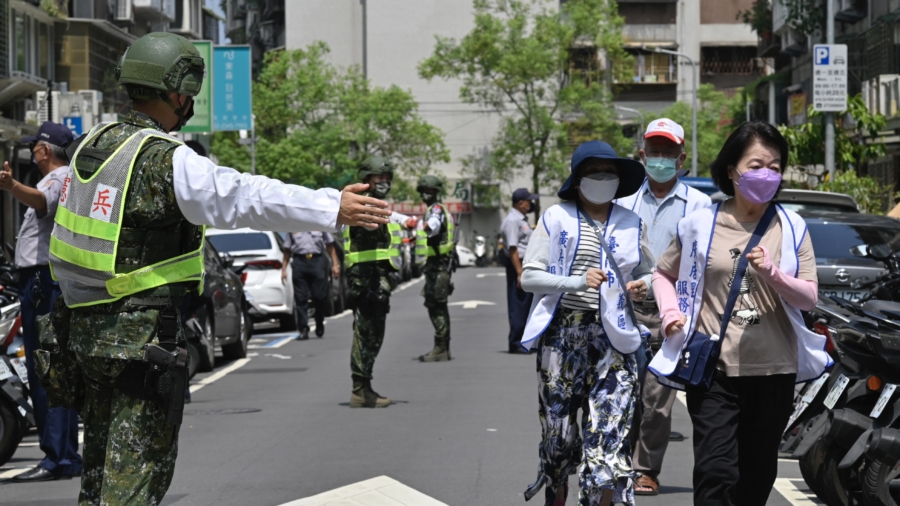Roads were cleared and people ordered to shelter indoors throughout Taiwan on July 25, as the island’s democratic government conducted drills simulating a missile attack by communist China.
A pre-announced “missile alert” text message was sent by the government, and sirens blared to life, announcing the mandatory drills early in the afternoon. Whole cities across northern Taiwan were effectively shut down as streets were closed and businesses shuttered for half an hour.
Shops turned out their lights to lessen the chance of being a target in the event of a nighttime air raid, and firefighters practiced putting out a blaze caused by a faux missile strike.
Air raid drills are required by law in Taiwan, where the populace frequently must contend with near-constant intimidation and military posturing by its neighbor China.
Such drills have gained a certain edge in recent months, however. The island raised its alert level following the Russian invasion of Ukraine due to fears that a newly emboldened China could launch an invasion of Taiwan.
“It is necessary to make preparations in the event of a war,” said Taipei mayor Ko Wen-je in a speech following the drills
“Chinese military planes have frequently harassed Taiwan in recent years and there’s even the outbreak of the Russia-Ukraine war in February,” Ko added. ‘These incidents remind us that we need to be vigilant in peace time.”
The drills coincided with the launch of five days of war games, during which the Taiwan military will mobilize dozens of fighter jets and 20 naval vessels to simulate an attack by China.
The first two days of the exercises will focus on air defense and preservation, followed by joint assault operations across the air force, navy, and army on day three. Days four and five will focus on homeland defense.
China Threatens Taiwan and the United States
The drills come just days after a series of headline-catching threats from the Chinese Communist Party (CCP) leadership, which objected to reports that U.S. House Speaker Nancy Pelosi was planning a visit to Taiwan.
The CCP threatened “forceful measures” against the United States and Taiwan should Pelosi go to Taiwan. Following the threat, President Joe Biden said that Pelosi should not go to Taiwan, a move that brought public condemnation for apparently placating CCP aggression.
The back and forth was just the latest in a line of increasingly bellicose threats from China’s communist leadership, however.
In June, China’s Defense Minister Wei Fenghe threatened U.S. Secretary of Defense Lloyd Austin, saying that China would “not hesitate to start a war no matter the cost” to prevent the world from recognizing Taiwan’s independence.
Following the dustup, Beijing issued an aggressive and ahistorical statement that there were no international waters in the 100 miles of ocean between the mainland and Taiwan. This, despite the fact that international waters begin just 12 nautical miles from the coast.
The ratcheting up of tensions and Taiwan’s preparation for Chinese missile attacks is similar to the Third Taiwan Strait Crisis, which took place in 1995 and 1996.
During that crisis, Taiwan’s then-President Lee Teng-hui accepted an invitation to deliver a speech at Cornell University on Taiwan’s experience of becoming a democracy. The CCP labelled Lee a “traitor” for his efforts and launched missiles into the waters near Taiwan’s busiest ports.
Further disaster was averted when the United States responded by sending two aircraft carrier groups to the region.
Failures of Ambiguity
The CCP claims that Taiwan is a breakaway province of China and has vowed to unite the island with the mainland. Its leadership has not ruled out the use of force in that endeavor.
Taiwan has been self-governed since 1949, and has never been controlled by the CCP. Its democratic government has vowed to defend itself and its de facto independence from Chinese aggression.
The United States recognizes the CCP’s claim, but maintains a 1979 treaty with Taiwan in which it guaranteed to supply Taiwan with the arms necessary for the island to maintain its own self defense.
For its part, the United States maintains the contentious policy of so-called “strategic ambiguity,” in which it neither confirms nor denies whether it would intervene militarily on Taiwan’s behalf in the event of a CCP invasion.
The strategy of ambiguity is intended to make Chinese authorities think twice about behaving aggressively toward Taiwan. The recent slew of CCP aggression may suggest that China’s leadership does not believe the Biden administration would overtly assist Taiwan in a war, however. As such, numerous lawmakers have demanded that the policy of strategic ambiguity be terminated.
From The Epoch Times


